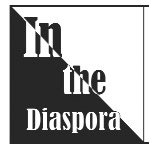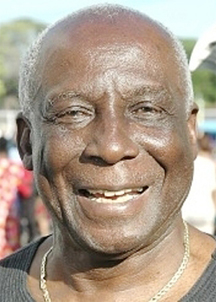Colin Rickards is an author, journalist, broadcaster and Caribbeanist with long connections to Guyana and its authors.
By Colin Rickards
Some 16 months ago, Jamaica-born Professor Rex Nettleford, social and cultural historian, dancer/choreographer, political analyst and trade union educator, was making his way to Toronto to carry out an External Review of the Caribbean Studies Program at the University of Toronto’s New College. Following that, he was to play a major role in the very first University of the West Indies (UWI) Benefit Gala in Toronto, which aimed to raise funds for the institution’s Regional Endowment Scholarships.

Tragically, he suffered a massive heart attack in a Washington, D.C., hotel and died five days later in hospital, on 2 February, 2010.
It was, therefore, particularly fitting for the Toronto Chapter of The University of the West Indies Alumni Association to host an event for the Canadian launch of The Rex Nettleford Foundation, and that it should have been held on U of T premises arranged by the Caribbean Studies Program.
The second UWI Benefit Gala was successfully held at the Four Seasons Hotel in Toronto on Saturday, 26 March, and about a hundred UWI alumni and friends responded to an invitation by Association Co-Presidents Michael Henville and Ferdinand Fortune to attend the Foundation launch next day.
The event was chaired by Dr. Jean Augustine, a Grenada-born former Canadian Member of Parliament, and currently the Fairness Commissioner for the Province of Ontario. Sir Shridath Ramphal, Chancellor Emeritus of the UWI and Chairman of the Foundation, was on hand to talk about its aims and objects.
“All humanity, and within it Jamaica, the Caribbean, the world of dance and culture, academe in our region and beyond, have all lost in Rex Nettleford, a rare incandescent eagle,” said Sir Shridath.
Created on May 28, 2010, the Foundation was officially launched on September 17 at a ceremony on the Mona Campus in Jamaica.

The lofty Mission Statement promises that it “will support scholars and programs that promote the strengthening of West Indian society in the areas of social and cultural development through research, community service and intellectual excellence.” It is aimed at “young leaders who grasp the importance of public service based on integrity, who have a desire to protect the weak, and who will use their energies and talents for the betterment of humankind.”
Sir Shridath and Nettleford worked closely when they were, respectively, Chancellor and Vice Chancellor of the UWI.
The Foundation has a nine-person Board which includes: Sir Alister McIntyre, Vice Chancellor Emeritus of UWI; Pro Vice Chancellor Professor Gordon Shirley, who is Principal of the Mona Campus; Vice Chancellor Professor E. Nigel Harris; Jeffrey Cobham, Chairman of the National Dance Theatre Company, and Cezley Sampson, Executor of the Nettleford estate.
It is intended that a multi-discipline academic Chair should be established at UWI’s Jamaica campus in the name of Rex Nettleford, and Vice Chancellor Harris, a Guyanese, revealed that there are plans to erect a statue of him on the Campus, an idea which came from the cultural icon’s lifelong friend and fellow educator Maud Fuller, who has made Toronto her home since the 1960s and who has made a substantial donation to get the necessary fundraising under way. “I would like it to be of him robed in his academic gown, and poised to dance Kumina,” she said. Fuller, who had a distinguished career at both the UWI and the U of T, was the Founder of the Toronto Chapter of the UWI Alumni Association, which she headed for more than two decades, and Vice Chancellor Harris, who made a presentation to her at the event, announced that one of the university’s Regional Endowment Scholarships is being named in her honour.
Tax deductible donations to The Rex Nettleford Foundation can be made through the UWI’s Institutional Advancement Division, with cheques being made payable to The University of the West Indies. For more information, visit www.rexnettlefordfoundation.com.
The UWI Alumni event was also the occasion for the presentation of a Rex Nettleford Lecture, given by the U of T’s Bahamas-born award winning poet Professor Christian Campbell, like Nettleford, a former Rhodes Scholar. He was introduced by noted author Rachel Manley, who spoke about Nettleford’s involvement in the nationalist movement in Jamaica, and his long friendship with her grandparents, Norman and Edna Manley, and with her father, Michael Manley, former Prime Minister of Jamaica (1972-1980 and 1989-1992).
Campbell called his lecture “The Shifting Ground: The Caribbean Elegy and The Diasporic Time of Mourning.” The Compact Oxford English Dictionary defines an Elegy as “a mournful poem, typically a lament for someone who has died,” and Campbell discussed Caribbean poems of this genre, relating them to time — both “Caribbean time” and “Diaspora time.” “The Caribbean is a Diaspora of Africa, Europe, Asia and the Americas,” he said — a turn of phrase which could have come from Nettleford himself.
Campbell also spoke of “sonic Afro-Modernity” and a “poetic manifesto of Diaspora” and, in an interesting visual sidebar, showed video clips of Whirling Dervishes — dancers — in Istanbul and Kumina dancers in Jamaica.
The poet and scholar mentioned a number of literary figures who have died relatively recently, referencing not only the death of Nettleford, but those of famed Martiniquan poet and novelist Aime Cesaire, who died in 2008 at the age of 94; Jamaican playwright Trevor Rhone, who died in September, 2009, aged 69; Barry Chevannes, also a Jamaican, who died at 70 in November, 2010; and Martinique’s poet, essayist and literary critic Édouard Glissant, who died last February aged 82.
Ranging widely, and sprinkling his remarks with references to living Caribbean poets Derek Walcott of St. Lucia, Lorna Goodison of Jamaica and Kamau Brathwaite of Barbados, among others, Campbell found inspiration and relevance beyond the English-speaking Caribbean. He especially praised the work of the internationally-acclaimed poet and publisher Lasana M. Sekou, who sometimes uses Creole, Spanish, French and Dutch in a single poem. He is from Dutch/French Sint Maarten/St. Martin, which Campbell described as an island which is “a half-Colony of two Empires,” and he lauded Sekou’s poetry collection called Nativity, which was published last year in a Trilingual English-French-and-Spanish Edition.
Standing in for U of T Professor Alissa Trotz, the Guyana-born Director of the Caribbean Studies Program — who was out of the country — Barbados-born U of T professor and author Melanie Newton said that the UWI Alumni event in a way “completed Professor Nettleford’s [intended] journey to Toronto” last year.





